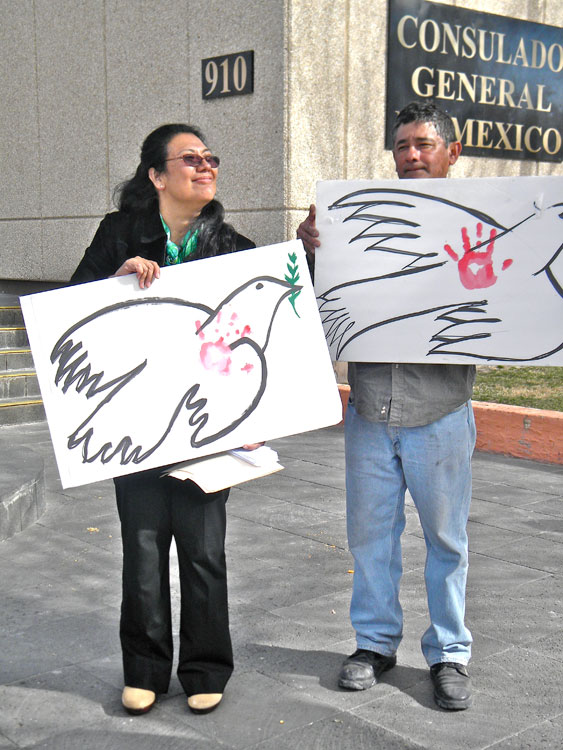EL PASO — The Spanish words on white poster-board picket signs carried by Nancy Gonzalez cry out for “Justice and peace for Cd. Juarez.”
To the left of Gonzalez, on a busy downtown sidewalk Selfa Chew holds up a poster with a blood-red handprint overlapping a peaceful white dove.

Justice and Peace for Ciudad Juarez. (Georgia Rodriguez/Borderzine.com)
Person after person walk by, some hesitant and others curious as they scan through the words of rage on the posters. Then they continue on with their day.
Every Friday from 2p.m. to 3 p.m., a group of individuals gathers in front of the Mexican Consulate building in downtown El Paso to remind the community of the assassinations and kidnappings of innocent people taking place right across the bridge in Cd. Juarez.
They raise their picket signs enthusiastically, purposely targeting the persons who walk in and out of the Mexican consulate and hand out leaflets about the latest kidnap victims in Juarez — a family of activists.
The words on the flyer go into detail about the Reyes Salazar family kidnapped in Mexico and the effort family members are making to get their loved ones back.
On February 7, social activists Elías Reyes Salazar, his wife Luisa Ornelas and Malena Reyes Salazar were kidnapped as a result of their outspoken disagreement with what they called the Mexican military’s unethical methods. “The Reyes family is very, very well known for their opposition to the military sector in Mexico,” said Selfa Chew, a history professor at the University of Texas at El Paso.
The Salazar family is has been targeted in Mexico because of their outspoken protests against the military Reyes, said Chew. Because of that, just like most kidnappings in Juarez, their kidnapping was planned and targeted, according to Chew. “Their kidnapping was not random. Unfortunately social activists are the targets of the Mexican government,” Chew said. The Reyes Salazar family’s home also was set on fire, destroying all of their possessions.
As a result of the kidnapping, fellow activists and family members, Marisela and Claudia Reyes Salazar have since gone on a hunger strike that will continue until their family members are safely returned.
“They have been losing a lot of weight, particularly Marisel because she started first and the first week she had already lost thirty kilos,” Chew said. The two women have been without food for two weeks.

History professor, Selfa Chew, and a group of activists gather every Friday at the Mexican Consulate to claim for justice. (Georgia Rodriguez/Borderzine.com)
Although their family’s return is the main reason for the hunger strike, Marisela and Claudia Reyes Salazar are engaging in this dangerous act to also seek justice for all the innocent victims in their community.
While Chew and fellow UTEP employee, Gonzalez, bring awareness of the assassinations and kidnappings to the people on the U.S. side of the border, Marisela and Claudia Reyes Salazar led a march in Juarez in support of their hunger strike and for justice for the victims who have been targeted.
Marisela and Claudia Reyes Salazar say they have no intention of stopping the hunger strike until their family members are safely returned. The legend on one of the posters says, “Alive they were taken. Alive we want them back!”
Although they are not receiving positive responses from the Mexican government, they are receiving support elsewhere. “They have refugee status in Spain and Canada so they are receiving the support of the international community,” Chew said.
As activists, their family remains a target in Mexico. Although they have the option to leave the country and stay safe, they maintain their residence in Juarez, now know as the most dangerous city in the world. “I don’t know if they are going to accept the offers from the other countries because they care a lot about their community,” said Chew.
Regardless of how the hunger strike ends, Chew, Gonzalez and the other members of the group who are passionate about ending the violence in Juarez, say they plan to maintain a presence every Friday form 2 p.m. to 3 p.m., outside the Mexican consulate in El Paso, to help other victims like the Reyes Salazar family.
